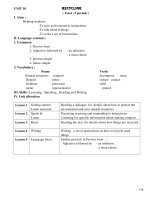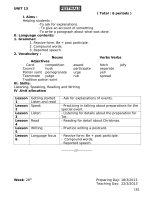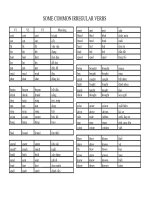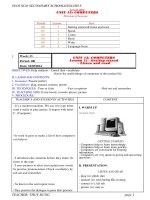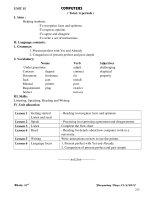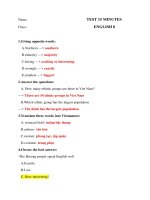unit 15 computers tiếng anh 8 sách cũ lê thị thanh trúc thư viện giáo án điện tử
Bạn đang xem bản rút gọn của tài liệu. Xem và tải ngay bản đầy đủ của tài liệu tại đây (112.23 KB, 5 trang )
<span class='text_page_counter'>(1)</span><div class='page_container' data-page=1>
<b>Week 34</b>
<b>Period: 102</b>
<b>Date: May 4th<sub>, 2017</sub></b>
<b>I/ AIM: By the end of the lesson, students will be able to consolidate some grammar points they have </b>
learned in units 9, 10, 11, 12, 13 and 14.
<b> II. LANGUAGE CONTENT: </b>
<b>GRAMMAR: Modals will to make requests, offers and promises, requests with “mind, passive, past </b>
progressive.
<b> III. TECHNIQUES: Teacher’s eliciting, ordering, matching, transformation, cues given, multiple </b>
choice.
<b> IV. TEACHING AIDS</b>
<b>V. PROCEDURES: </b>
<b>TEACHER’S AND STUDENTS’</b>
<b>ACTIVITIES</b>
<b> CONTENT</b>
<b>ORDERING</b>
Teacher asks her students to put the parts of
the sentences into meaningful ones.
a. please / you/ open the windows / Will?
b. the doors/ opening/ please/ Would you
mind /?/
c. I/ do that again/ won’t/ promise / I/ . /
d. a book/ reading/ is/ The boy/ Ba.
e. five dollars/ made/ is / The old lamp/
in China.
f. from/ is made/ household and garden
waste/ Compost / . /
g. are / completely / dried / The glass
pieces / . /
Feedback
<b>* Introduction: The lesson today will help</b>
you consolidate how to use the grammar
points such as passive, promises, offers,
requests, passive and participles.
<b>Matching</b>
<b>A/ </b>
<b>1/ WARM UP</b>
<b>Review</b>
a/ Will you open the window, please?
b/ Would you mind opening the doors?
c/ I promise I won’t do that again.
d/ The boy reading a book is Ba,
e/ The lamp made in China is five dollars.
f/ Compost is made from household
and garden waste.
g/ The glass pieces are dried completely.
<b>2/ PRESENTATION </b>
<b>a/ Request with ‘Will”: </b>
<b>Will you + inf … , please?</b>
Ex: Will you open the window, please?
<b> (+) Acceptance: Sure. // </b>
</div>
<span class='text_page_counter'>(2)</span><div class='page_container' data-page=2>
1/ Will you ….., please?
2/ Do you mind …. ?
3/ Would you mind … ?
4/ I suggest you ..
5/ I suggest ….
<b>B/</b>
a/ opening the window
b/ should open the window
c/ open the window
* KEY: 1 – c; 2 – a; 3 – a; 4 – b; 5 - a
Teacher summarizes the requests and their
responses with acceptance and refusals.
- What do you use “Will …, please?” for? –
To make requests.
- What are the answers? –Sure. OK. …
- How do you replace the request with “Do/
Would you mind…?”
- Do/ Would you mind opening the window?
- How do you use “suggest” to make the
request?
- I suggest opening the window.
- I suggest you should open the window.
<b>Matching</b>
A/
1/ Shall I …?
2/ Do you mind if I …?
3/ Would you mind if I …?
B/
a/ closed my book
b/ close my book
<b>* KEY: 1 – b; 2 – b; 3 – a</b>
Teacher summarizes the offers and
requests with ‘Shall I”, “mind” and their
responses with acceptance and refusal.
c/ - A student comes to class late. She says:
“I’m sorry, teacher. I’m late. I promise I
won’t do that again.” – I hope so.
Teacher summarizes the promises and its
responses.
- What do you use “I promise I won’t/ will
…” for? – To make promises.
- How do you reply? – I hope so.// …
<b>Matching</b>
<b>A/</b>
OK. // All right.
<b>(-) Refusal: I’m sorry, I can’t. // </b>
I’m afraid not.
<b>Requests with </b>
<b>“Do / Would you mind (not) + V- ing?’</b>
Ex: Would/ Do you mind opening the window?
(+) No, I don’t mind.// No, of course not.// Not at all.
(-) I’m sorry, I can’t.
<b>Suggest: suggest + V- ing; </b>
<b> suggest + should (not) clause</b>
Ex: I suggest opening the window.
I suggest you should open the window.
<b>b/ Offers: Shall I close my book? </b>
<b>* Requests with </b>
<b>- “Do you mind if I + inf…?</b>
<b>- Would you mind if I + simple past..?</b>
Ex: Do you mind if I close my book?
Would you mind if I closed my book?
(+) Acceptance: Please do.// Please go ahead.
(-) Refusal: I’d prefer/ rather you didn’t.
<b>c/ Promises with “Will” or “Won’t”</b>
Ex: I promise I won’t do that again.
<b>Reply: I hope so. // Good. // </b>
I’m glad. // Don’t forget.
<b>d. 1/ Passive in present tense:</b>
Ex: Compost is made from household and garden waste.
(Active: People make compost from household and
garden waste.)
is/ are (not) + past participle
<b>d.2/ Passive in future tense:</b>
</div>
<span class='text_page_counter'>(3)</span><div class='page_container' data-page=3>
1/ Compost … from household and garden
waste.
2/ This project … next month.
3/ Sydney Opera House … in 1973.
4/ Nam … at five last night.
5/ Nam was reading when the phone …
<b>B/</b>
a/ rang
b/ was completed
c/ will be started
d/ is made
e/ was eating
<b>* KEY: 1 – d; 2 – c ; 3 –b; 4 – e; 5 – a</b>
Teacher summarizes the passive in three
tenses, past progressive and their forms.
<b>Choose the best option</b>
Students work in pairs. They choose the
correct option:
1/ Trash ….
A/ has been B/ has been reduced
C/ has reduced D/ reduced
2/ The glass … into small pieces.
A/ broken B/ is broken C/ breaks D/ break
3/ Would you mind if I …here?
A/ sit B/ to sit C/ sitting D/ sat
4/ The dictionary … in Vietnamese is 200,
000 dong.
A/ writes B/ is written C/ written D/ wrote
5/ While we were talking, the teacher …
A. comes B. come C. came D. is coming
6 / Would you mind if I … on the TV?
A/ turn B/ turned C/ turning D/ to turn
7/ What … you … at this time yesterday?
A. were … doing B. is ..doing C. was .. doing
8/ The Statue of Liberty … to the United
States by France in 1876.
A. presented B. is presented C. was presented
9/ The final exam … at the end of this month.
A. will be held B. will hold C. held
10/ I like books … by Nguyen Du.
A. wrote B. writes C. is writing D. written
<b>Transformation</b>
* Groups of the students rewrite the sentences
with the following cues given:
Will be + past participle
<b>d.3/ Passive in past simple tense:</b>
Ex: Sydney Opera House was completed in 1973.
Was/ were + past participle
<b>e/ Past progressive:</b>
Ex1: Nam was reading a book at five last night.
Ex2: Nam was reading a book when phone rang.
Ex3: While Nam was reading a book, the phone rang.
<b>3/ PRACTICE </b>
<b>Answer key:</b>
1/ B
2 / B
3 / D
4 / C
5 – C
6 – B
7 – A
8 – C
9 – A
10 – D
<b>4/ PRODUCTION/ Marks (10pts)</b>
<b>Answer: </b>
1/ I suggest going by bus.
(Do you mind going by bus?
Would you mind going by bus?)
2/ I suggest you should take out your books.
</div>
<span class='text_page_counter'>(4)</span><div class='page_container' data-page=4>
1/ How about going by bus?
I suggest …
(Do you mind/ Would you mind…?)
2/ Why don’t you take out your books?
I suggest you …
3/ Thousands of people visit Ba Den
Mountain every year.
4/ They make the fire without matches or
lighters.
The fire …
5/ I want to take some photos.
Would …..?
(Do …
Teacher helps students with their homework.
How to prepare for revision 2
very year.
4/ The fire is made without matches or lighters.
5/ Would you mind if I took some photos?
(Do you mind if I take some photos?
Do/ Would you mind my taking some photos?)
<b>5/ HOMEWORK</b>
<b>* Prepare for revision 2</b>
<b>*Reading skill: Read the texts about festivals and</b>
wonders and recycling facts in the textbook again until
you can remember the key words.
<b> </b>
<b>*Checking attendance:</b>
8A5: ………
<b>*Comments:</b>
………..
………
………….
</div>
<span class='text_page_counter'>(5)</span><div class='page_container' data-page=5></div>
<!--links-->



